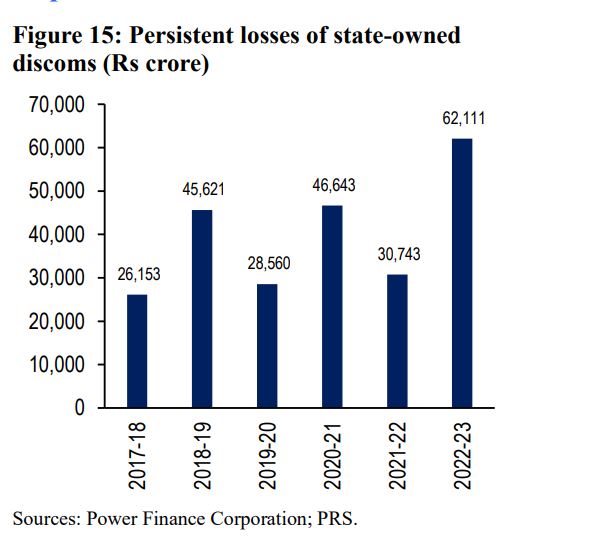NEW DELHI: The financial health of state-owned electricity distribution companies (DISCOMs) in India deteriorated sharply in 2022-23, with aggregate losses doubling to ₹62,111 crore from ₹30,000 crore in the previous year. According to a report by PRS Legislative Research, the losses were primarily attributed to a steep rise in power purchase costs, driven by increased reliance on imported coal and soaring international coal prices.

India’s reliance on imported coal surged by 107% in 2022-23, with imports totaling 56 million tonnes. The average price of imported coal jumped from ₹8,300 per tonne in 2021-22 to over ₹12,500 per tonne in 2022-23.
The growing dependence on imported coal raises many questions. First, is it really just the inflated price of imported coal, or has it been deliberately inflated and linked to the Adani scam? According to an October 2023 Financial Times investigation, the Adani Group, the country’s largest private coal importer, is accused of inflating coal import costs, leading consumers and businesses to overpay for electricity.
ALSO READ: States struggle to effectively utilize Centrally Sponsored Scheme funds, says PRS

The Financial Times report reviewed 30 shipments of coal from Indonesia to India by Adani between 2019 and 2021, revealing discrepancies between import records and export declarations. The value of these shipments inexplicably rose by over $70 million during transit. Additionally, Adani has been accused of misrepresenting low-quality coal as high-grade fuel in transactions with Tamil Nadu’s state utility, TANGEDCO. Evidence suggests that the group purchased Indonesian coal of 3,500 calories per kilogram but sold it as 6,000-calorie coal, more than doubling its profit.
According to evidence cited by the Financial Times, Adani sourced the coal in Indonesia from a mining group known for its low-calorie output, at prices consistent with low-grade fuel. It delivered the coal to India’s southernmost state for power generation, fulfilling a contract that specified expensive, high-quality fuel.
ALSO READ:Swiggy Q2FY25: Revenue rose to ₹3,601.45, Instamart showed strong performance
Reacting to the same issue, Congress’ Chairman of the Media and Publicity Department, Pawan Khera, said, “If the allegations outlined in the Financial Times report are accurate, it paints a troubling picture of corporate malpractice at the cost of public welfare. The purported manipulation of coal pricing, buying lower-calorific-value coal and misrepresenting it as higher-grade coal is not only unethical but also a direct assault on the principles of fair business practices.”
He further said, “This alleged scam, if proven, would represent a nexus of corporate greed and regulatory failure, resulting in overburdened DISCOMs, higher electricity prices, and financial strain on ordinary citizens. The inflated costs have ripple effects, deepening the financial woes of the already struggling power sector.”
“The Indian National Congress has consistently raised concerns about the opacity and favoritism surrounding the Adani Group’s operations. We have repeatedly called for impartial investigations into such allegations. The government must address whether there were lapses in regulatory oversight, and if so, those responsible should be held accountable. This issue is symptomatic of a larger problem where the common man bears the brunt of corporate misdeeds, and we must work towards greater transparency, accountability, and fairness in our energy and infrastructure sectors.” he added.
Khera urges the government and investigative agencies to act decisively to ensure that “the truth comes out, justice is served, and the faith of the people in India’s democratic and economic institutions is restored.”
The PRS report, authored by Tushar Chakrabarty and Shrusti Singh, highlighted a sharp rise in the gap between the average cost of supply (ACS) and the average revenue realized (ARR), which reached ₹0.47 per unit—the highest in six years. This gap widened due to a 15% hike in the per-unit cost of power, further intensifying financial strain on state budgets and DISCOMs.
The second question that arises is why states are relying so heavily on coal when imported coal is more expensive than domestic coal and the government is aggressively promoting renewable energy sources like solar.
DISCOMs’ financial health is also constrained by their debt burden, which reached ₹6.6 lakh crore (2.5% of GDP) as of March 2023. Despite the pressing need for ₹4.3 lakh crore to upgrade distribution infrastructure between 2022 and 2027, only ₹1.9 lakh crore has been secured through RDSS and other sources.
The report also highlighted that another reason for the struggles of DISCOMs is that some states do not allow the automatic pass-through of increases in fuel costs in pricing. Furthermore, the underpricing of power has been a persistent issue for state-owned DISCOMs. For instance, a white paper by the Tamil Nadu government (2021) noted that power tariffs in the state had not been revised for seven years.










